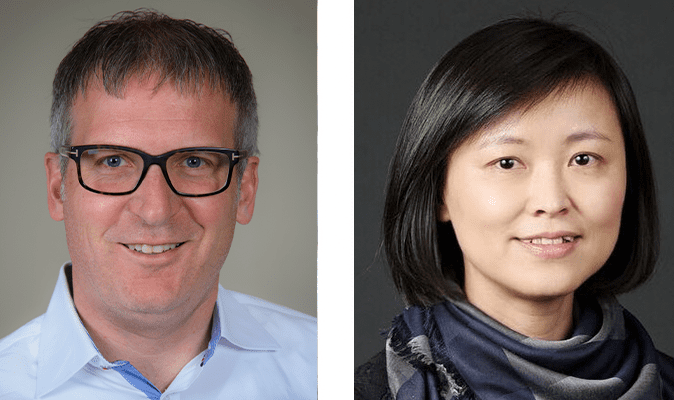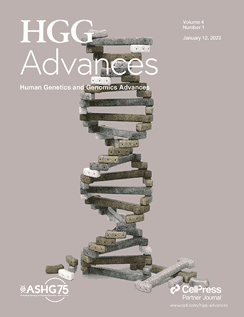
and Mingyao Li, PhD
At HGG Advances, the newest and fully open access ASHG journal, the Editorial Board oversees all aspects of the review process. This team of academic editors brings a wealth of scientific expertise and experience to the journal that ensures fair and constructive evaluation of each submitted manuscript. They work with authors throughout each step of the publication process, with a shared goal of publishing interesting and robust science. To ensure a productive and collaborative process, authors may request an Associate Editor, as a handling editor, whose expertise best matches their submitted work.
This month, two of the HGG Advances Associate Editors, Mike Innes, MD, University of Calgary, and Mingyao Li, PhD, University of Pennsylvania, share some of their thoughts and advice to help demystify the publication process. This advice is particularly relevant for trainees and early-career investigators who are just learning the ins and outs of scientific publishing.
The very first step in publishing is selecting the right journal; many factors contribute to this important decision-making process. Dr. Innes noted, “I suspect many are focused on a user-friendly submission process and a fair and timely review process; these are all really important. However, I would also ask trainees to consider what I might call the ‘production value’: are the papers well laid out and well-illustrated, allowing your work to look its best? Particularly in my area–Mendelian Disease–it is important to publish in a journal that sees the value and provides the space in properly telling the clinical story and demonstrating and when necessary, illustrating the phenotype. Only then can patients and their families, clinicians, clinical labs, and basic scientists really benefit from your published work.” Dr. Li highlighted several key considerations, including finding the right audience. She also suggests that authors “consider the quality of the peer review process, as well as turnaround time, when choosing a journal. Many journals now publish peer reviews and publicize their turnaround times. Choose a journal that has a rigorous peer review process so that you can get constructive feedback on your work.” Another suggestion was to “consider whether a journal offers an open access option, as open access can make your work more accessible.”
Once submitted, the work is evaluated by editors and reviewers. Because HGG Advances Associate Editors are practicing scientists, they are well-positioned to speak about the evaluation process from the standpoint of both levels of review. The two editors noted the importance of well-written titles and abstracts. Innes suggests that authors, “consider the title and abstract as the front yard and front door of [their] paper–critical in making a first impression!” As noted by Li, “the title should be easy to understand so that it can help attract readers and increase the visibility of your paper. Write an abstract that provides a clear and concise summary of your paper. The abstract should also highlight the significance, main findings, and overall impact of your paper.” Innes also stressed the importance of knowing your audience, especially if you are trying to reach a wide audience. Drawing from his experience in rare disease research, he notes, “I see some authors who write too specific an abstract and it’s not clear how the findings are generalizable. But on the other hand, some authors would appear to be trying so hard to show the generalizability of their work that the name of the condition or gene under study isn’t even mentioned in the title or abstract.”

Of course, a scientific paper is much more than written text. Li suggests that authors pay particular attention to their figures. “Provide high-quality figures that contain easy-to-understand information about the methods and main results of the paper. Each figure should also have an informative legend to help readers understand without having to reference the results or methods section of the paper.” In short, the editors point out that the best papers are written with a goal of engaging the readers.
We also asked the editors about the benefits of becoming involved in the editorial process, either as reviewers or editors. Both Innes and Li noted that both roles can help scientists keep up with the latest developments in their fields. Li further remarked that “serving as an editor or a reviewer will also help you improve your writing and research skills by exposing you to different writing styles and research approaches.” She also commented on the importance of community in the publishing ecosystem. “As we all rely on others to review our own papers, it is important that we pay back to the community and contribute to the field by helping identify high-quality research. You can also help promote rigor of research by providing constructive feedback to authors and helping to ensure the published papers meet high standards.” Moreover, she notes, “serving as an editor or a reviewer can also increase your visibility in your field and help you build your professional network.”
In thinking specifically of the peer review process, Innes noted, “Think about the best papers you have read; it is unlikely that these read precisely that way when they were originally submitted. While it’s easy to think of peer review as serving as a barrier to a publication, really it is a great mechanism to enhance scholarly work. I review constantly, and I learn something from every paper I review. In reviewing papers, you often see clear or important questions that are not clearly covered in the submission. This also helps my own publications, if I realize there is something missing from my paper that I would insist on as a reviewer, then my paper isn’t ready for submission yet.”
To those considering expanding their involvement in the publication process beyond reviewing, Innes suggests that “serving as an editor provides a greater opportunity to advocate for themes, article types or other directions for a journal, so this is really a privilege. In addition, as an editor, you may be exposed to manuscripts slightly outside your main knowledge base (the types of papers you see as a reviewer), so this is an exciting way to see a bigger picture of the field.”
It is clear that the HGG Advances editorial team is engaged and excited to work with authors to publish exciting science. Check out the journal’s latest content or submit your research to HGG Advances. ASHG members receive a 20% discount on open access fees at HGG Advances, so be sure to renew your membership today!
